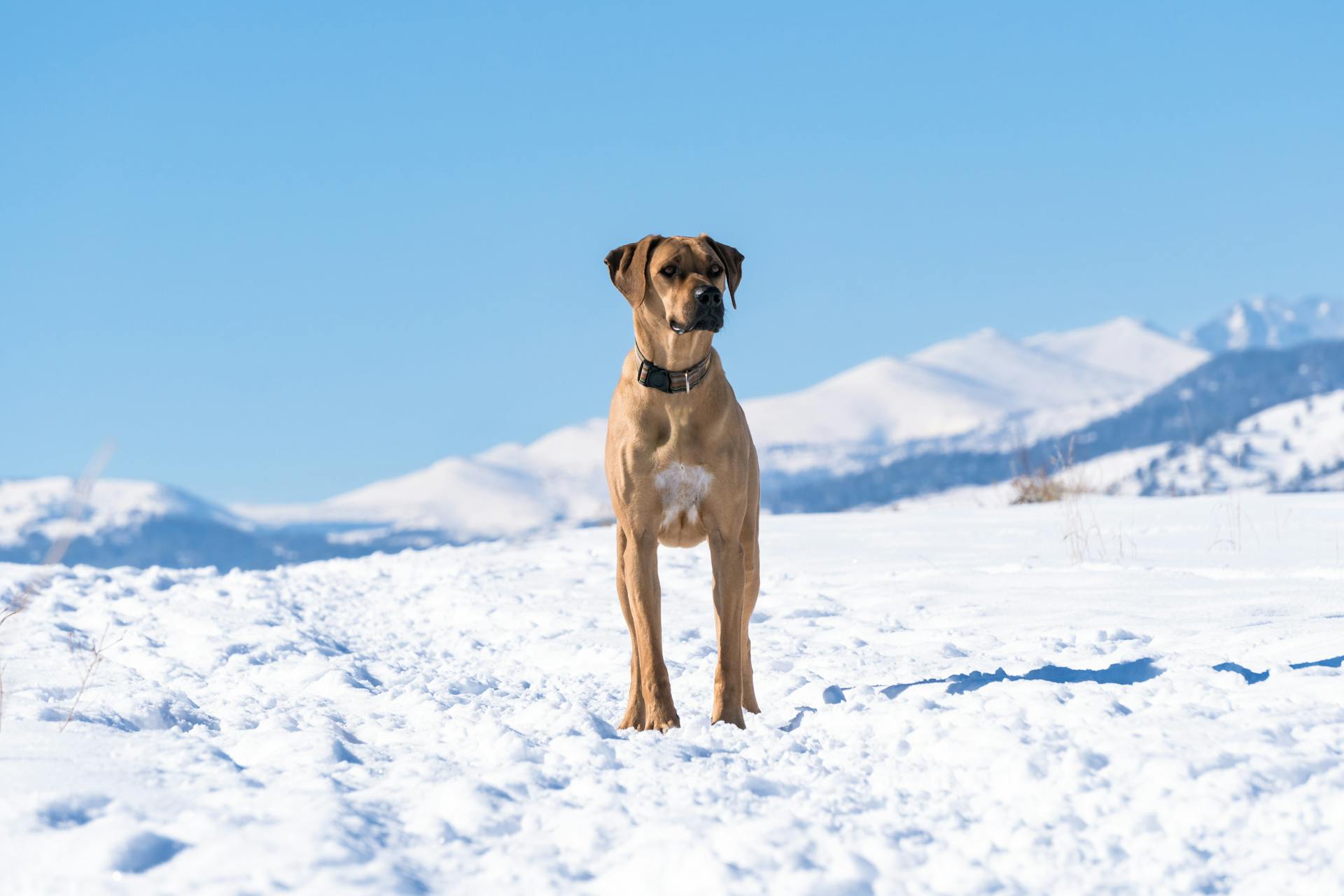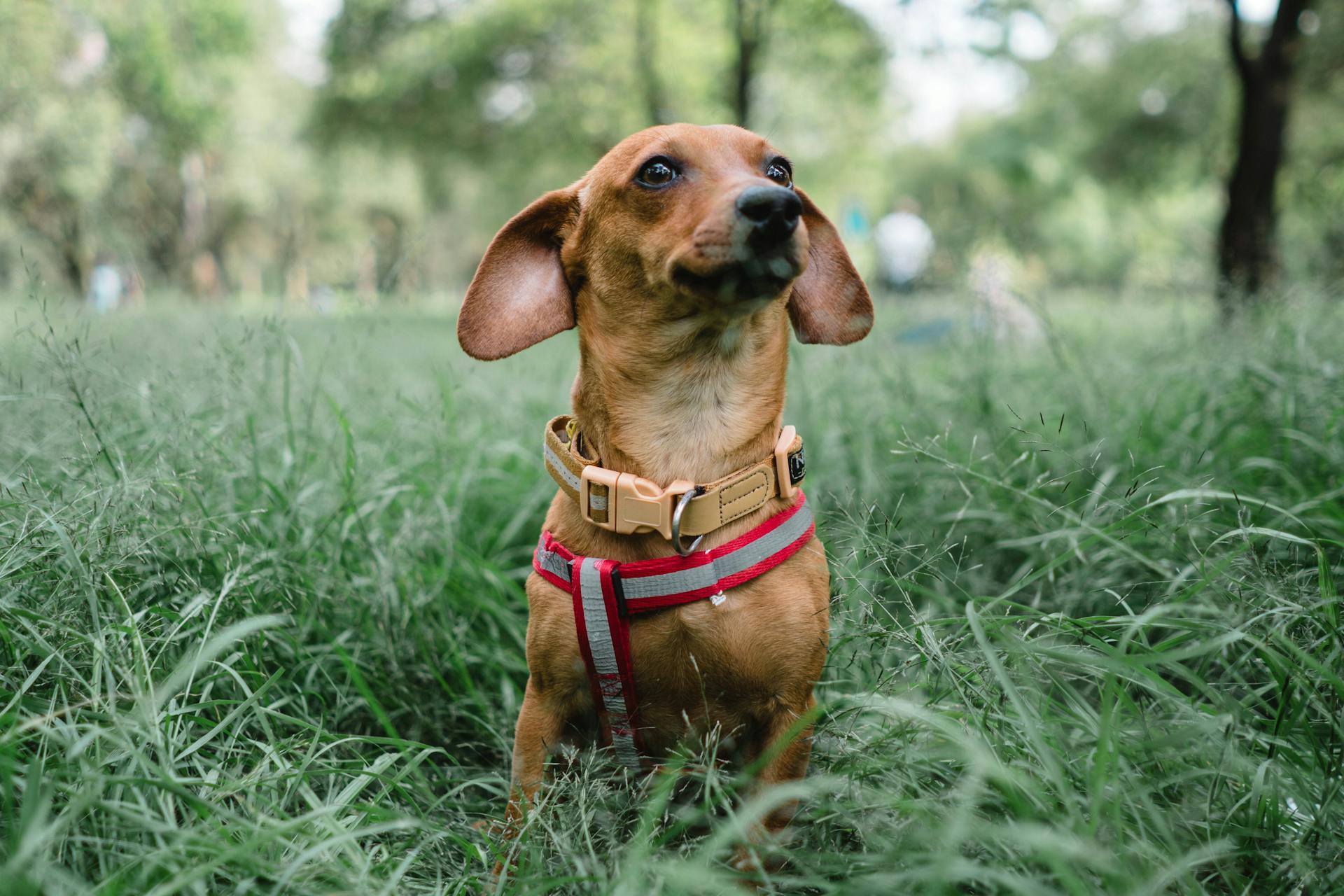
Rhodesian Ridgebacks are known for their strong protective instincts, which can sometimes manifest as aggression. This breed was originally bred to hunt lions, and their history of guarding and protecting their territory is still a part of their nature.
Their independent nature can sometimes be misinterpreted as aggression. Rhodesian Ridgebacks are not typically aggressive, but they can be wary of strangers and may take time to warm up to new people.
Early socialization is key to preventing aggression in Rhodesian Ridgebacks. This means exposing them to various environments, people, and experiences from an early age.
You might enjoy: Why Do People like Chihuahuas
Ridgeback Basics
Rhodesian Ridgebacks were initially bred by Dutch farmers in Africa using European dogs and semi-wild dogs native to Africa. This was done to create a dog that could hunt and protect farms and families.
Their original purpose was to be bold enough to pursue lions while the hunter set up for the fatal shot, but also understand when it was a losing battle and stand down.
Today, Rhodesian Ridgebacks are quiet and gentle, but still exhibit the lion hunter's fearlessness, independence, and loyal traits.
Rhodesian Ridgebacks are intelligent dogs with a very protective streak, bred to protect and serve hunters in Zimbabwe.
They can be very standoffish with strangers if not properly trained and socialized, leading to problems like reactive or fearful aggression.
With proper training and socialization, Rhodesian Ridgebacks can be tolerant of strangers and controlled in their protectiveness.
Ridgebacks are kind and gentle with their families, despite their hunting ancestors.
However, they do need structure and an outlet for their physical energy, or behavioral problems like anxiety or boredom can occur.
Curious to learn more? Check out: Rhodesian Ridgeback Behavior Problems
Ridgeback Aggression
Rhodesian Ridgebacks are not generally aggressive, but they can exhibit certain behaviors that may be regarded as dangerous. They have a strong prey drive, which can cause them to chase smaller creatures, and high energy levels that may lead to destructive behavior if not managed.
Their high energy levels can sometimes be a problem, especially around children or new owners, and may unintentionally knock them over or play too rough. They are great with children, but their enthusiasm needs to be managed.
Aggression in dogs usually starts with warnings and ends with an attack, and Rhodesian Ridgebacks are no exception. They may display warnings such as growls, barks, snapping, harsh glares, snarls, and biting.
Socialization is the most effective way to combat aggression in Rhodesian Ridgebacks, and it's essential to introduce them to different places, sounds, experiences, and people under 16 weeks of age. Your vet can give you great advice on how to properly socialize your puppy.
The signs of a dog showing aggression or calming, appeasing signals pre-aggression can include avoiding eye contact, yawning, lip licking, ears pinned back against the head, lowering the body to the floor or crouching, freezing or stiffening, vocalizing or growling, snapping, biting or lunging.
It's essential to notice these signs and take action to prevent aggression in your Rhodesian Ridgeback. By socializing them properly and recognizing the early signs of aggression, you can help prevent behavioral problems and keep your dog happy and healthy.
Health and Care
To keep your Rhodesian Ridgeback happy and healthy, it's essential to watch her diet and make sure she gets plenty of exercise. A consistent and high-quality diet is crucial, so feed her a diet appropriate for her age.
You should also supervise your pet as you would a toddler, keeping doors closed and pick up after yourself to prevent her from getting into trouble. This includes blocking off rooms as necessary and keeping her away from objects she shouldn't put in her mouth.
Brushing her coat and teeth regularly is also vital. Brush her coat at least weekly, and her teeth at least twice a week to keep them perfect. Cleaning her ears weekly is also necessary, even as a puppy.
Here are some key health and care tips to keep in mind:
- Brush her coat at least weekly.
- Brush her teeth at least twice a week.
- Clean her ears weekly.
- Keep her diet consistent and high-quality.
- Exercise her regularly, but don't overdo it at first.
Your Dog's Health
Your dog's health is a top priority, and understanding the potential health concerns specific to their breed can help you provide the best possible care. Many diseases and health conditions are genetic, meaning they are related to your pet's breed, so it's essential to be aware of the most common issues seen in Rhodesian Ridgebacks.
Rhodesian Ridgebacks are more at risk for certain health problems, but that doesn't mean your dog will definitely develop them. Regular check-ups and a preventive health plan can help watch for and prevent some predictable risks.
A proper diet and exercise routine are crucial for your dog's overall health. Feed a high-quality diet appropriate for your dog's age, and don't give them people food. This will help keep their digestive system happy and prevent any potential problems.
Here are some essential care tasks to keep your dog happy and healthy:
- Supervise your pet as you would a toddler to keep them out of trouble.
- Brush their coat at least weekly, and their teeth at least twice a week to keep them clean and healthy.
- Clean their ears weekly to prevent infections.
- Exercise your dog regularly, but don't overdo it at first to prevent exhaustion.
- Keep their diet consistent and provide plenty of fresh water.
Remember, regular check-ups and a preventive health plan can help identify potential problems early on, so be sure to follow the recommended schedule of examinations and vaccinations.
For your interest: Dogs Breeds That Start with B
Mast Cell Tumor
Mast Cell Tumors are a particularly nasty type of skin cancer. They are found more often in Rhodesian Ridgebacks.
Early detection and removal of Mast Cell Tumors is crucial, as many cancers can be cured by surgically removing them. The sooner they are surgically removed, the better.
Mast Cell Tumors can often look just like other kinds of skin lumps and lesions. Some of these are harmless, while others are not.
Surgical removal of questionable lumps is recommended, as all suspicious lumps should be tested.
Is a Ridgeback Right for Your Family?
If you're considering bringing a Rhodesian Ridgeback into your family, it's essential to understand their temperament and needs. They're intelligent dogs with a very protective streak.
Rhodesian Ridgebacks are bred to be loyal and independent, which can sometimes make them standoffish with strangers. They need to be trained well and socialized early to combat these traits.
If properly socialized, Rhodesian Ridgebacks can be tolerant of strangers and controlled in their protectiveness. They make great companions for adventurous families.
Ridgebacks are kind and gentle with their families, despite their hunting ancestors. They've been honed and shaped into companion dogs today.
Ridgebacks need structure and an outlet for their physical energy, or behavioral problems like anxiety or boredom can occur.
See what others are reading: Dog Breeds That Don't Need Grooming
Keeping Your Dog Safe
Be consistent with your training to prevent aggression problems in your Rhodesian Ridgeback.
Early socialization and training are crucial in shaping your dog's behavior and ensuring it grows up to be calm around people and other animals.
It's a great idea to enroll in a top-notch puppy training program if you want to avoid aggression problems in the future.
To prevent your Rhodesian Ridgeback from chasing after smaller animals it may see running, it's best to walk it on a leash.
If you have kids, make sure they know the dog's preferences and needs and ask them not to play with the dog when it is eating or focusing on a specific task.
To prevent boredom and destruction, make sure your Rhodesian Ridgeback has lots of exercise and space to run around.
Here are some essential tips to keep your Rhodesian Ridgeback safe:
- Walk your dog on a leash to prevent it from chasing after smaller animals.
- Provide your dog with plenty of exercise and space to run around.
- Ensure your dog has plenty of mental stimulation along with physical exercise.
- Divert your dog's interest with a toy or treat if you recognize when they are ready to misbehave.
- Teach your kids to respect your dog's preferences and needs.
Understanding Ridgeback Behavior
Rhodesian Ridgebacks are not generally aggressive and are gentle-natured, even though they can be stubborn. They are especially calm and gentle around their families.
Their history and temperament play a significant role in their behavior, and understanding this is essential before becoming an owner. The breed was initially bred by Dutch farmers in Africa using European dogs and semi-wild dogs native to Africa.
For another approach, see: Friendly Giant Dog Breeds
Rhodesian Ridgebacks have a strong prey drive, which can cause them to mistake smaller creatures for prey and chase them. This is a natural instinct that needs to be managed.
In most cases, aggression is either inherited or learned, and all dogs are born with a certain amount of hostility essential for survival. Rhodesian Ridgebacks are no exception, but they are not inherently aggressive.
Their high energy levels can sometimes be a problem, especially around children or new owners. They need to be managed, or they can become destructive by digging up the yard or chewing and tearing up furniture.
Rhodesian Ridgebacks are intelligent dogs with a very protective streak. They were bred to protect and serve hunters in Zimbabwe, so they are alert and can be very standoffish with strangers.
If properly socialized, Rhodesian Ridgebacks can be tolerant of strangers and controlled in their protectiveness. They are wonderful family companions and excellent watchdogs.
Their loving side will always be present, and they make great companions for adventurous families and those used to more independent dog breeds.
Featured Images: pexels.com


